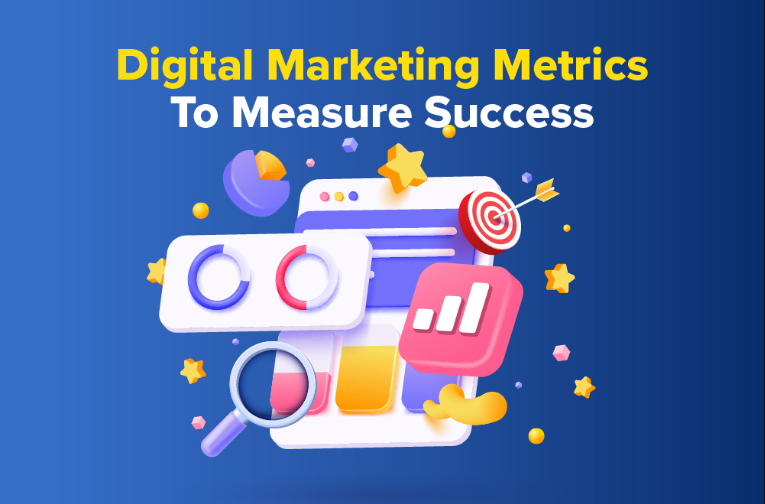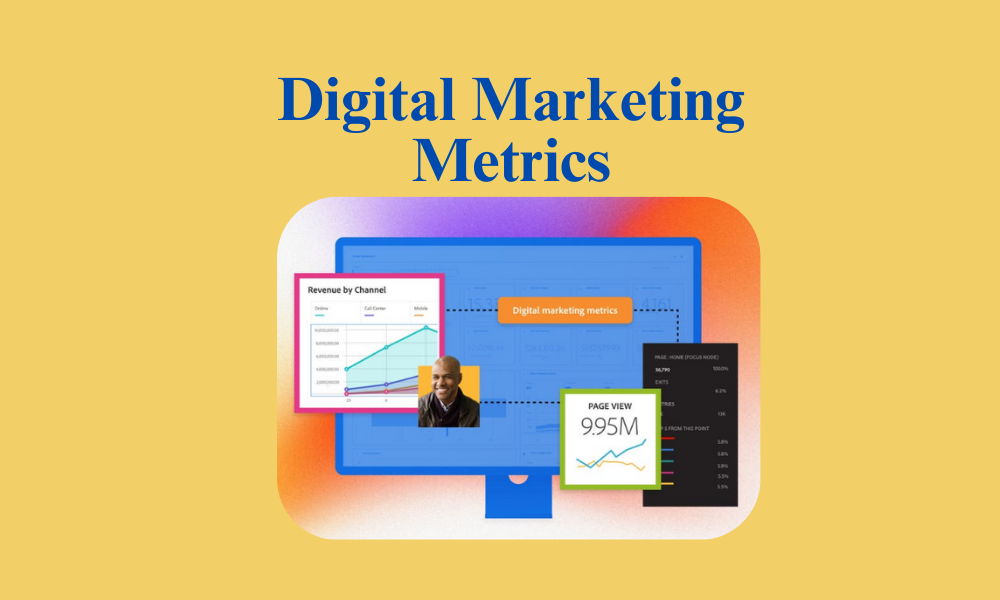Every business aims to accomplish long-term success in the digital landscape. The question that arises here is how to determine success. Tracking your success is crucial in today’s rapidly evolving digital marketing era.

With the availability of numerous metrics, you may lose your way. This article will delve into the insights about digital marketing metrics that matter for gauging your campaign`s success.
Table of contents
What are Digital Marketing Metrics?
Digital marketing metrics are quantifiable measures used to evaluate the success and performance of digital marketing campaigns. They help marketers understand the effectiveness of their strategies, track progress, and make data-driven decisions to optimize future efforts. Here are some common digital marketing metrics:
- Website Traffic: Measures the number of visitors to a website. Key metrics include page views, unique visitors, and sessions.
- Conversion Rate: The percentage of visitors who complete a desired action, such as making a purchase or filling out a form.
- Click-Through Rate (CTR): The percentage of people who click on a link or ad out of the total who view it.
- Bounce Rate: The percentage of visitors who leave a website after viewing only one page.
- Cost Per Acquisition (CPA): The average cost to acquire a new customer through a marketing campaign.
Understanding the Importance of Digital Marketing?
Metrics have a key role in a successful marketing strategy. It is impossible for marketers to understand user’s behavior without metrics. In simple words, metrics offer detailed insights of the campaign helping marketers to make data-driven decisions.

If you are wondering what metrics are effective, you must know there are various metrics from social media to conversion rate and customer lifetime value. You can use them to evaluate the progress of your marketing campaign.
Website Traffic
Why It Matters: Website traffic is a fundamental metric that indicates the number of visitors to your site. It’s a primary indicator of your online visibility and marketing reach. Tools like Google Analytics provide detailed insights into your website traffic, including the number of visitors, page views, and sessions.
Conversion Rate
The conversion rate measures the percentage of visitors who complete a desired action, such as making a purchase or filling out a form. It directly reflects the effectiveness of your marketing efforts. Google Analytics, HubSpot, and other marketing platforms offer conversion tracking features to monitor this metric.

Bounce Rate
The bounce rate indicates the percentage of visitors who leave your site after viewing only one page. A high bounce rate may suggest issues with your site’s content, user experience, or relevance. Google Analytics provides data on bounce rates, helping you identify pages that need improvement.
Customer Acquisition Cost (CAC)
CAC measures the cost of acquiring a new customer. It helps businesses evaluate the efficiency of their marketing spend and strategies. Calculate CAC by dividing the total marketing costs by the number of new customers acquired during a specific period.
Customer Lifetime Value (CLV)
CLV estimates the total revenue a business can expect from a single customer account throughout their relationship with the company. It helps in understanding the long-term value of customers. Use historical purchase data and customer behavior analytics to calculate CLV.
Social Media Engagement

Engagement metrics (likes, shares, comments) reflect how well your content resonates with your audience on social media platforms. Each social media platform provides analytics tools to measure engagement. Additionally, tools like Hootsuite and Sprout Social aggregate this data for easier analysis.
Improvement Through Metric-Driven Innovation
Metrics are vital for transforming data into strategic insights that drive decision-making and maximize ROI. To stay ahead in digital marketing, continuous improvement through metric-driven innovation is essential. Instead of relying solely on past successes, companies must:
- Constantly analyze and optimize their metrics to remain competitive in a rapidly evolving market.
- Embrace new technologies such as artificial intelligence and machine learning to fully harness the potential of metric analysis.
By continuously improving and innovating through metrics, companies can:
- Differentiate themselves from competitors.
- Achieve long-term success in the digital age.
Conclusion
Tracking and analyzing digital marketing metrics is essential for understanding the effectiveness of your marketing strategies and making data-driven decisions. By focusing on key metrics like website traffic, conversion rates, bounce rates, CAC, CLV, social media engagement, email open rates, and ROI, businesses can optimize their marketing efforts and achieve greater success in the digital age.
Read more : The Ultimate Guide to Social Media Marketing Success
FAQs
Digital marketing metrics are measurable values that help businesses track the performance of their marketing efforts and make data-driven decisions.
Tracking metrics allows businesses to understand the effectiveness of their marketing campaigns, optimize strategies, and improve ROI.
Google Analytics, HubSpot, Mailchimp, Hootsuite, and Sprout Social are popular tools for tracking various digital marketing metrics.
Regular analysis is recommended. Depending on the metric, you might review some daily (e.g., website traffic) and others monthly or quarterly (e.g., CAC and CLV).

Alex Mitch
Welcome to my blog! With over 10 years in digital marketing , I’ve seen its incredible impact on smaller businesses. Join me as we explore how digital marketing can grow your audience and boost your business. Whether you’re an experienced entrepreneur or just starting out, you’ll find practical tips and insights to enhance your digital marketing strategies.





